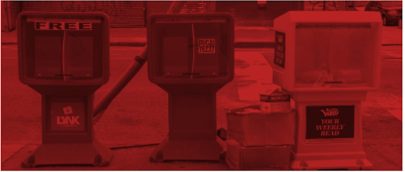Efforts to Expand Broadband and Advance “Digital Equity” Should Also Strengthen Local News
At least half of news deserts are also broadband deserts — “double deserts.” If we provide broadband without strengthening local news, we may make matters worse.
Roughly $100 billion dollars has been allocated by Congress to make high speed Internet more available and affordable to millions of Americans. In many cases, it is up to states to determine how to distribute the funds. Congress has declared that part of the effort should improve “digital equity.”
Rebuild Local is making the case that a sensible definition of digital equity would include a drive to strengthen local news in many areas, and to use local news organizations as partners in advancing broadband. Here is our proposal to the U.S. Department of Commerce.
In research done for Rebuild Local News, Pennsylvania State University doctoral candidate Ryan Wang and Professor Christopher Ali looked at news deserts to see what kind of broadband availability they had. The results were alarming: Almost half of the news deserts were also broadband deserts. In what we’re called “double deserts,” residents lack the ability to access credible, useful information applicable to their communities. Moreover, the situation is likely worse than this stark statistic describes because it does not take issues of affordability of both broadband and local news or the rise of ghost newspapers into account.
Years of scholarship has shown that when local news leaves communities civic participation suffers. Fewer candidates participate in local elections and fewer citizens vote in those elections. Residents are less likely to know who their elected representatives are and less likely to feel connected to their communities. In areas that lack local news, problems associated with a lack of local news, like misinformation and polarization, could be exacerbated as newly connected residents turn to social media and national outlets to fulfill information needs unmet by local news outlets. Local information is a key component of civic participation and the ability to be a civic participant is a key component of digital equity
Given the role of local news in informing and educating communities, we called on the Commerce Department to include local news outlets and projects in several Digital Equity Act programs including the Competition Grant Program, State Digital Equity Plans and the Capacity Grant Program. In practice, we propose that news outlets be eligible to receive grants to cover areas that qualify as double deserts. We also propose that programs to cover broadband access issues and programs that provide digital literacy training and civic engagement opportunities also be eligible for funding.
What can you do?
- Read and share our proposal. Click here to download a PDF of our proposal with footnotes.
- Contact your state’s broadband authority, share our comments and encourage them to speak with local news outlets as they write and submit their digital equity plans.
- Determine whether you have Double Deserts in your state – Look at the un- or underserved areas on your state government’s broadband maps and compare them to areas that are un- or underserved areas with local news.
- If you’re a newsroom, you could reach out to your local libraries, especially if there is an existing partnership, or other community partners to advocate with your local broadband authority together.





